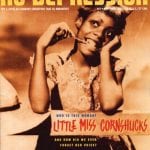Lizzie West: No stone unturned
It’s only natural for young composers to dream of one day meeting their musical idols. But not many take matters into their own determined hands the way Lizzie West did three years ago, when — with her dog Figaro and filmmaker Atar Schimmel in tow — she drove cross-country to meet Leonard Cohen.
Her gutsiness paid off. After tracking her quarry to his Hollywood lair, she was invited to stay for a few days, even accompany him to his Zen Buddhist retreat. “He was such a sweet man, and we got along wonderfully, even though the communication was very sparse,” says West, who had commissioned Schimmel to document the trek. “And Leonard’s friendship with Figaro was totally profound — Figaro doesn’t like anybody, but he loved Leonard. And Leonard loved him — he called him ‘Creature.'”
The movie, originally titled Looking For Leonard Cohen, is now dubbed Holy Road, after West’s smoky, beatnik-cool full-length debut for Warner Bros., Holy Road…Freedom Songs (released April 29 to follow up an eponymous EP that included a cover of Cohen’s definitive “I’m Your Man”). On finger-popping folk ditties such as “Jenny”, “Dusty Turnaround” and “I Miss You, Baby”, it feels like West is channeling the coffeehouse vibe of 1960s Greenwich Village through Natalie-Merchant-meets-Sandy-Denny pipes.
She glows with a similarly retro aura in person, sporting a Bowery Boys brimmed cap, thigh-high suede pirate boots, a white miniskirt and faux-fur bolero jacket, and discus-sized shades that complete the “Ciao, Manhattan” look. Why did the 29-year-old ex-playwright choose Cohen to pursue? Like many of her tales, it’s quite a serendipitous story.
Born Elizabeth Westergaard, she fell in love with a pawnshop guitar and put her thespian career on hold. Busking in New York subways led to the coffeehouse circuit, where she began covering early Cohen classics such as “Bird On A Wire”. Like her poetic muse Walt Whitman, West decided to re-write her own “bible” — a leather-bound diary she called “The Holy Road”, which she still carries with her.
After wrong turns took her to both Whitman’s grave and his birthplace one weekend, she reckoned “that Walt was trying to tell me something. So I thought, ‘Well, like he had gone to Emerson at a time when nobody would listen to him, maybe I could go to Leonard Cohen.'”
After a couple of breakdowns, the curious trio finally sputtered into Los Angeles. “And by then, Leonard had heard about us breaking down and even being robbed, and he’d heard my music, knew what kind of artist I was, and he was expecting me,” West recalls. “So he became another stone in my Holy Road — it was just meant to happen. I knew I would speak to him and he would tell me things, and he did.”
Back home, West is currently launching a pet project — the Center for Social, Philosophical and Spiritual Research, ostensibly an artistic think tank. She sees something of the divine in every mundane occurrence, she insists.
“And when you’re giving in and creating your existence in collaboration with the force and someone like Leonard Cohen fortuitously comes into the picture, it’s yet another message,” she adds. “Like Whitman’s grave — they’re all messages. Stones. I simply pick up these stones in the Holy Road and gather them as I go.”




